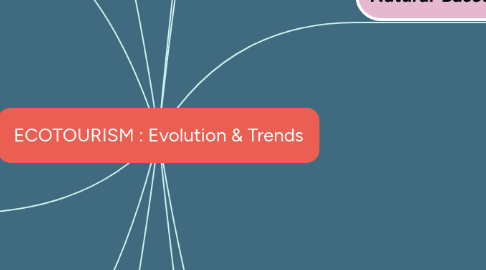
1. Types of environmental education within the protected and non-protected areas - education in terms of species and genetic diversity which takes the form of simple observation and in-depth learning. - education in terms of ecosystem diversity and how to minimise the conflict of environmental functions derived from tourism activities.
2. 2. Activities in terms of human & wildlife : ~ consumptive use (nature walks) ~ non-consumptive use (hunting) ~ low consumptive (animal park)
3. 1. (Ziffer, 1989:6) 'Ecotorism is a form of tourism inspired primarily by the natural history of an area. Visits relatively undeveloped areas in the spirit of appreciation participation and sensitivity.'
4. SCOPE AND DEFINITIONAL PERSPECTIVE OF ECOTORISM
4.1. 1. Global estimates revealed that in Australia and New Zealend, 32% of visitors search for the scenery, wild plants, and wildlife, as part of their trip. 2. In Africa, 80% of tourists who visited countries in this continent named wildlife as a primary motivational Attribute. 3. North America, 69-88% of the Eropean and Japanese travellers considered wildlife and bird-watching to be the most important attributes of their visits.
4.2. On this point, it has been noted that it is more feasible to threat ecotorism as a spectrum with a variety of products rather than attempting to define ecotorism from a spesific stance or products (Wight, 1993a, b). More specifically, it was claimed that the spectrum included both (Wight, 1995b: 57):
4.2.1. Supply factors: (nature and resilience of resources; culturalor local community preferences type of accommodation)
4.2.2. Demand factors: (Types of activities and experience; degree of interest in natural or cultural resources; degree of physical effort)
5. Natural-Based Component
5.1. Activities & The Natural-Based Component
5.1.1. Sustainable Management Component
5.1.1.1. Emphasis on sustainability recognises the ecological & cultural element as a key activity from ecotourism .
5.1.1.2. 1. Environmentel Impact
5.1.1.2.1. Direct Benefits : - provides incentive for restoration & conversion of modified habitats Indirect Benefits: - space protected because of ecotourism provided various environmentel benefits
5.1.1.2.2. Direct Costs : - rapid growth rates - idea that all touris induces stress Indirect Costs : - fragile area may be exposed to less benign of tourism
5.1.1.3. 2. Economic Impact
5.1.1.3.1. Direct Costs : - ongoing expenses (promotion ,wages) Indirect Costs : - opportunity costs
5.1.1.4. Direct Benefits : - creation of direct employement opportunities Indirect Benefits : - indirect revenues form ecotourist (high multiplier effect)
5.1.1.5. 3. Socialcultural Impact
5.1.1.6. 4. Education Impact
5.1.2. Direct Costs : - imposition of elite alien value system Indirect Costs : - potential resentmen & antagonism of locals
5.1.2.1. Direct Benefits : - spiritual element of experiences Indirect Benefits : - option and existence benefits
5.1.3. 1. Three main categories - activities dependent on nature (i.e, bird watching) - activities enhand by nature (i.e, camping) - activities the natural setting is incidental (i.e ,swimming)
